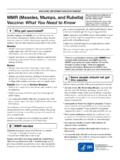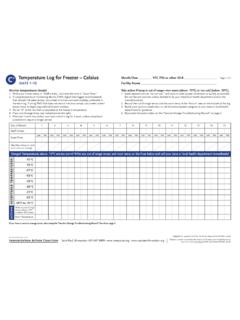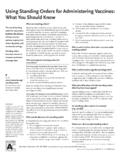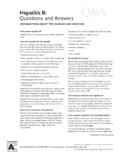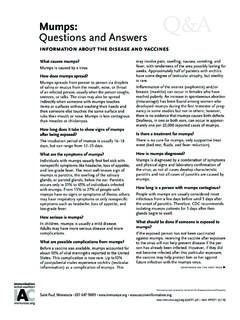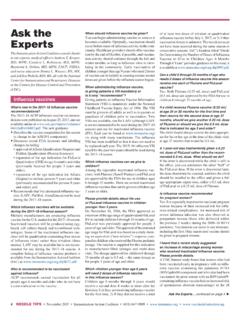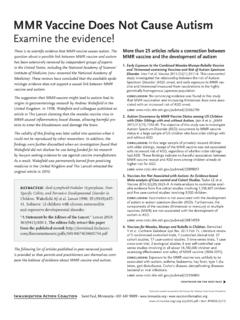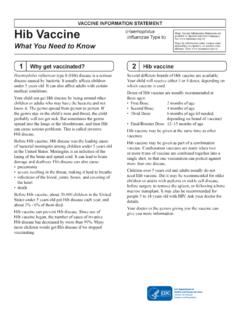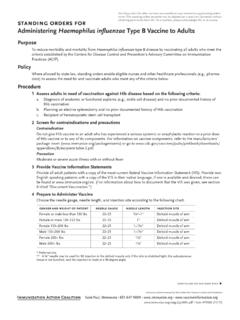Transcription of Vaccines and the Right of Conscience by Edward J. Furton
1 53 Vaccines and theRight of ConscienceEdward J. FurtonAs a father of five, I have been confronted with the question of whether tovaccinate my children against rubella ( German measles ). As many now know, thisvaccine is currently produced from a cell line that had its origin in Twoother Vaccines are similarly implicated in the tragedy of abortion: the hepatitis A andthe new varicella ( chicken pox ) Vaccines . As unfortunate as these facts are, ananalysis of the problem, using traditional Catholic moral principles, does not seem toindicate that there is any obligation on the part of parents to avoid the use of theseproducts. For my own part, therefore, I have not hesitated to have my childrenprotected against these , there are many parents who have come to the opposite conclu-sion.
2 They believe that it would be immoral to inoculate their children with theseproducts. They hold that a vaccine with even the most remote connection to abortionis forbidden to them, and thus, they refuse immunization on the grounds of con-1 The rubella vaccine , produced by the pharmaceutical manufacturer Merck & Co.,Inc., uses WI-38 cells. There are two hepatitis A Vaccines , one produced by Merck, theother by Glaxo SmithKline, both of which use MRC-5 cells. The varicella vaccine , againproduced by Merck, uses both WI-38 and MRC-5 cells. For the scientific details on WI-38 cells, see L. Hayflick and P. Moorehead, Serial Cultivation of Human Diploid CellStrains, Experimental Cell Research 25 (1961), 585 621. For MRC-5 cells, see , Jones, and Baille, Characteristics of a Human Diploid Cell DesignatedMRC-5, Nature 227 (July 11, 1970): 168 170.
3 Also of interest are L. Hayflick et al., History of the Acceptance of Human Diploid Cell Strains as Substrates for Human VirusVaccine Manufacture, Development of Specifications for Biotechnology Standards 68(1987): 9 17; and Plotkin et al., Attenuation of RA27/3 Rubella Virus in WI-38 Hu-man Diploid Cells, American Journal of Diseases of Children 118 (1969): 178 NATIONAL CATHOLIC BIOETHICS QUARTERLY \ SPRING 200454science. What is the status of this refusal? Can it be supported by Catholic teaching?We have a moral obligation to follow the light of Conscience . Indeed, this duty is sofundamental that, even if one s judgment is in error, Conscience must still remain thestandard of our conduct. To argue otherwise would be to say that we should do whatwe personally judge to be a theoretical standpoint, therefore, the path would seem to be who reject all association with abortion should feel free to refuse vaccinationfor themselves and for their children.
4 Nonetheless, when this approach is put intopractice, many difficulties arise. For example, objectors often face a problem whenthey attempt to place their children into a school system, whether public or administrators, who have both a moral and legal obligation to protect thehealth and well-being of their students (as well as their teachers, school administra-tors, and all who work there), routinely prohibit attendance by children who have notbeen vaccinated against rubella and other contagious diseases. Many states offerexemptions from immunization requirements; some do not or only for very specificreasons. Thus a state may accept a religious exemption, but may refuse one based onmedical concerns if they are deemed unjustifiable. In cases where an exemption isdenied, parents find themselves with very few difficulty is heightened for Catholics because there is no official teachingof the Church on the question of whether the use of these Vaccines is are, it is true, various probable opinions issued by respected Catholic theolo-gians and Catholic organizations, but the Church itself has taken no position.
5 ThusCatholic parents who object to immunization with Vaccines implicated in abortioncan make no appeal to official church teaching, and if they attempt to do so, they arelikely to be shown a statement from some recognized Catholic authority that contra-dicts their views. Can an appeal to Conscience serve as a ground for an exemption tovaccination when there is no Catholic teaching on this matter? To explore this ques-tion is the purpose of this Danger of These DiseasesLet us first be clear about the seriousness of these diseases because some-times opponents to vaccination argue that these diseases are minor. Take rubella asan example. This disease is indeed usually mild in children, causing a rash on the faceand neck that usually lasts two or three days.
6 Teenagers and young adults may alsoexperience swollen glands in the back of the neck and some swelling and stiffness inthe joints. Most people recover quickly and without any after effects following infec-tion. The primary danger of harm from this disease, however, is to unborn babies. Awoman who contracts rubella in the early stages of pregnancy has a chance of givingbirth to a deformed baby. This risk is estimated at twenty percent by the Centers forDisease Defects range from deafness, blindness (atrophic eyes, cataracts,chorioretinitis), and damaged hearts to unusually small brains. Mental retardation is apossibility. Miscarriages can also occur among pregnant women who contract the Centers for Disease Control and Prevention of the Department of Healthand Human Services website at \ Vaccines AND THE Right OF CONSCIENCE55 The purpose of vaccinating young children, therefore, is not simply to protectthem personally from the discomfort of a fairly mild disease, but also to prevent theunborn children of pregnant women from suffering through contact with infectedchildren.
7 Children who are immune to rubella cannot spread it to others. A girl whoattains adulthood will also be protected against contracting this disease and transmit-ting it to her unborn child, though it is important to realize that it can still sometimeshappen that one who is properly vaccinated is This shows that the closersociety comes to universal compliance against rubella, the smaller the danger will beof an outbreak of this disease. Thanks to the efforts of primary care physicians andpublic health officials, rubella has been nearly eradicated in the United States. Thelast large-scale outbreak occurred in 1964 when almost twenty thousand babies wereborn with severe birth defects. This is something we all hope will never the primary reason why we should use the rubella vaccine is to protectthe unborn.
8 The issue, in essence, is one of justice, which, as Catholic theologianshave defined it, is the one virtue that is directed toward the good of others. Justiceimplies a type of equality among human beings, Thomas Aquinas says, and he states,by way of example, that a man s work is said to be just when it is related to someother by way of some kind of equality, for instance, the payment of the wage due forthe service rendered. 4 In the present case, however, we have the equality of ourcommon human nature, which obliges each of us to respect the Right to life andhealth that belongs to every human being. We live in a world, of course, in whichmany claim that human beings are not equal by nature, but that some should beaccorded greater value than others.
9 The Catholic tradition sees this as a denial of ourinherent human dignity, and if it recognizes any such distinction at all, it is thatpreference ought to be given to the weakest and most vulnerable among us. Thosewho are unborn and who are subject to the possibility of contracting a serious anddebilitating disease within the womb are members of this Right of ConscienceMost people tend to think of Conscience as a mental faculty, but for Aquinasconscience is the act of arriving at a correct moral conclusion about what is to bedone and John Paul II says the same The principles that ought to guide us inour conduct toward each other are not inborn, but are acquired over time throughexperience and education; hence, we must first acquire a moral code before we can3 Daniel A.
10 Salmon et al., Health Consequences of Religious and Philosophical Ex-emptions from Immunization Laws: Individual and Societal Risk of Measles, Journal ofthe American Medical Association (July 7, 1999): 47 53. This study indicates thatas the number of exemptions to vaccination increases, the incidence of infection amongthose who have been properly vaccinated also Aquinas, Summa theologiae, II-II, Q. As he states at ibid., Q. , Since justice by its name implies equality, it denotes essentially a relation to another, fora thing is equal, not to itself, but to another. 5 For Conscience , according to the very nature of the word, implies the relation ofknowledge to something: for Conscience may be resolved into cum alio scientia, , knowl-THE NATIONAL CATHOLIC BIOETHICS QUARTERLY \ SPRING 200456exercise Once we have a grasp of the principles of morality, we canapply these to our daily life.
